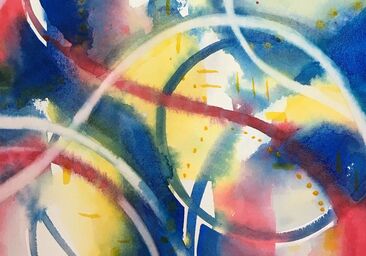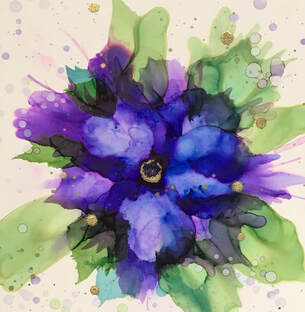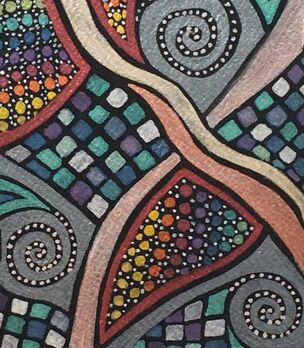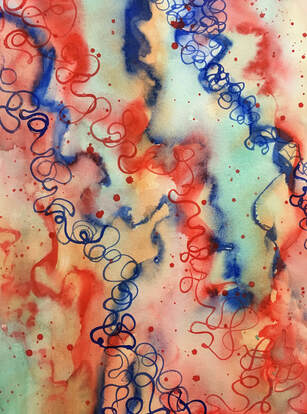 Rollercoaster Rollercoaster I do not like rollercoasters. On the very few occasions I have subjected myself to that wild ride, I have kept my eyes closed and held on tight. Instead of a thrill, I feel ill. ************************************************************************************************* Often on my birthday, I find myself revisiting my memories of the year that has passed and reflecting on my life in general. On this year’s particular birthday in the midst of the COVID-19 pandemic, my feelings are of gratitude. How very fortunate I am for many things in my life. It has been eight months now that my life has been given back to me by the gift of a new “beautiful cornea” for one of my eyes. Just how blessed I am to have it was made even clearer to me on the day before I was to have my second corneal transplant for the other eye. Late in that day I received the news that there was no acceptable cornea for me, and the surgery was cancelled. While my brain knew this was a possibility, I could not believe how badly my body felt at the news. I asked my husband, “Why do I feel so bad?” He replied that he too felt bad, and so we commiserated together. This disappointment, physically felt, required a few days to recover to my usual self. This news also arrived just a few days before the closure, due to the pandemic, of all my work venues where I teach art courses. My two weeks of planned recovery during Spring Break have now stretched into nine “stay home” weeks. Additionally, the pandemic has left my next transplant surgery in limbo. The virus can be transmitted through a corneal transplant and there is no easy way to determine if a gifted cornea is virus-free at this point. I cannot express the gratitude I feel everyday for the gift of one good eye that has allowed me to function. My other eye, which had been the better of the two, is now often debilitatingly blind. During those few days and the following weeks as I have experienced the lows of my little rollercoaster, I have had a tiny inkling of the bigger, wilder, and stomach dropping rollercoasters of others whose transplant requirements are of a life and death nature. I have counted my blessings and asked myself serious questions: Why have I never given consent to become a donor? How can I, as a caring human being, deny a life-giving gift and easing the rollercoaster ride for someone else? Isn’t it time that I registered my consent? Yes, it is. So I did.
0 Comments
 Painted before my surgery when my vision was poor, it is a joy to see it clearly. Painted before my surgery when my vision was poor, it is a joy to see it clearly. A living being is a remarkable thing. **************************************************** My cornea transplant was my surgeon’s first surgery of the day, and after my hour of lying in recovery at the hospital, I was taken home around noon. This first day of recovery was a little rough. For the remainder of that day, and two days more I was to lie flat on my back. Before the surgery most of my apprehension focused on whether I could actually manage the three days of bed rest. For the first day, boredom is not an issue as you are recovering from the sedation and feel quite sleepy. In my case after lying on my back for a couple of hours I had an excruciating pain in my back. I told my caregiver (my mother) this and she it was really too early to have back pain from such a short time lying down. As the day progressed and my discomfort increased, I began to realize that the pain was being caused by what was happening in my lower abdomen. I was bloated and not feeling well at all. It was at about 6 o’clock in the evening when I got up for a bathroom break that my body decided it was time to get rid of whatever was bothering me. I became very hot and I called to my husband saying that I was going to faint. He arrived to find me ripping off all of my clothes because I was burning up, and just in time to catch me and to bear the brunt of my being sick to my stomach. He had to catch me because I was afraid to put my head down to stop the fainting as I had been told to keep my head tilted back and my eyes to the ceiling. It is very difficult to vomit with your head tilted backwards and I was terrified that I would undo this surgery and ruin the precious new cornea I had just been given. (Subsequently I have found out that lying on my side would have been the best solution and I am keeping this in mind for next time!) This little episode necessitated a call to the surgeon, and as I had none of the other symptoms of rejection, he figured it was a reaction to the sedation and perhaps other drugs that had been put in my eyes for the surgery. He suggested Gravol and I took some which helped a little. The next day when I saw him, he said the eye looked fantastic. To combat the boredom of the next two days, I had several Podcasts downloaded, and I listen to a whole season of the CBC’s “Someone Knows Something”. And while I drifted in and out of sleep and probably missed a whole episode, it kept my mind occupied with its mystery. I was now allowed 30-minute breaks three times a day to get up and move around a little, eat, and use the bathroom. After the first day I no longer had to keep my head tilted back which made doing those things a whole lot easier. After three days of lying on my back I was allowed to be up as per usual. Immediately I could see the difference in my eye. It took about three days to recover from the three days of lying on my back. My lower back had seized up so that even walking was difficult. But I did walk as much as I could bear. At my one-week check-up I asked my surgeon when he would determine that I could drive again. “Let’s do that now” he said. So, I read the letters and I with my new, one-week-old eye, I surpassed where it was legal to drive. He said, “Drive when you feel comfortable”, and so I did. One week earlier, my vision had been so bad that I was limiting my driving. I recently had my four-week check-up and the result is so good that I am now on the list to have surgery on my other eye. After only four weeks, I am back to all of my regular activities. But more than that, I am no longer on the downward spiral to total blindness. I can only marvel at the awesome healing properties of my living body.  Jewels on the Ceiling #1 Jewels on the Ceiling #1 I could not believe I was having the surgery, until I was having the surgery. It was at that moment just before I walked into the operating room with my eye frozen, a THIS IS REALLY HAPPENING moment. Even though I’d been told years before that a cornea transplant was the only treatment option for my Fuchs’ Dystrophy, I did not believe it. It would not happen to me, and I put it out of my mind. Was this a way to cope? Was it denial? I could not think about this surgery or all panic would break out inside of me. The way they prepare you for a cornea transplant is pretty much the same way they prepare anyone who’s going to have cataract surgery. In the eye clinic they brought us in one-by-one, sat us in the big recliners, and prepared to give us medicine to relax and calm, and drops to clean and freeze our eyes. When I was brought into this room, I was sat down in the biggest recliner at the head of the two rows of recliners on either side and was told that I was the “Queen” that day. The only difference that I noted, was that I was prepared to receive intravenous sedation, and instead of getting drops to dilate my pupils, I was given drops to restrict them. When the surgeon and my cornea were ready, I was walked into the operating room and lay down on the operating table. The sedation was mild with the intention that I not fall asleep. I was to be able to say “stop” because I had to cough or sneeze. To my knowledge I was awake for the whole procedure and I looked up at ceiling watching the dancing light show before my eyes. Swirling, bright, sparkling jewels. At one point I felt a tremor go through me. The surgeon stopped and said something along the lines of “Don’t do that.” But I had to say I had no idea what had happened there. Possibly I fell asleep and jerked awake. Another thing they really don’t want you to do. Once the surgery was finished, I was wheeled out to lay in recovery for an hour. I’m pretty sure I slept then. When it was assessed that I could go home, my driver came, they wheeled me to the car, and I lay down in the seat as far back as it could go, keeping my head back and my chin pointed up when transferring. In just thirty-five minutes, the transplant surgery was done. What do you see when you are blind? When I have imagined blindness, I have always thought that it would be dark. Black, like night, when you are fumbling to find the bathroom and there is no light. But the blindness that has enveloped me is light - a white fog that one day would white-out my sight like a blinding blizzard. The condition that I have is known as Fuchs’ Dystrophy, a degenerative cornea disease for which there is no cure. There is limited treatment to manage the symptoms but those will not stop the eventual progression to blindness. The only way to prevent this blindness is with a cornea transplant. Last week, I became a cornea transplant recipient. The path to a new vision is now beneath my feet and I have taken the first step.  "Andante Grazioso" (Mozart Piano Sonata No. 11) Watercolour on Paper This is the last painting I finished before my first cornea transplant surgery. It was inspired by Mozart's Sonata No. 11 as the title suggests. Can you feel the music in this piece? |
Dixie MacUisdinWelcome to my vision journal. Archives
May 2020
Categories |
 RSS Feed
RSS Feed